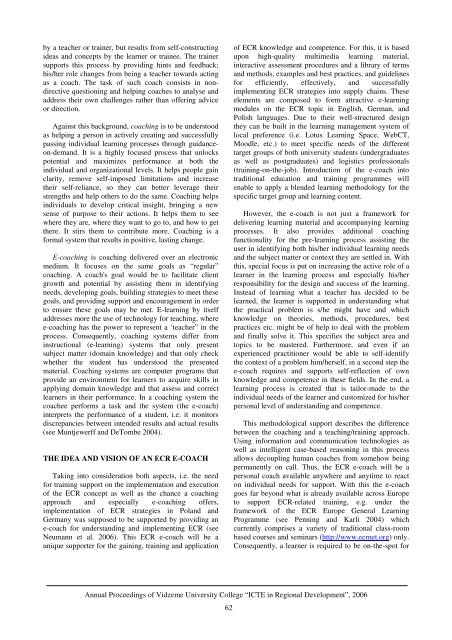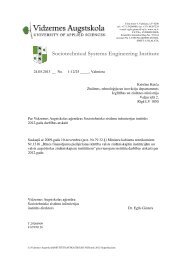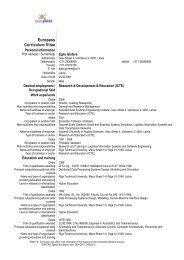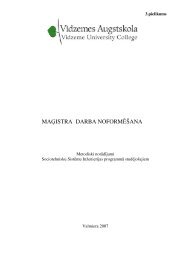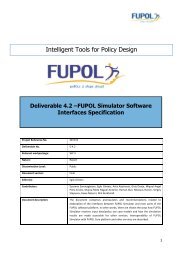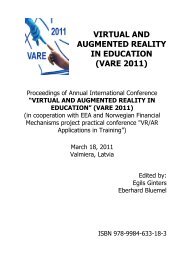Proceedings in pdf format. - Sociotechnical Systems Engineering ...
Proceedings in pdf format. - Sociotechnical Systems Engineering ...
Proceedings in pdf format. - Sociotechnical Systems Engineering ...
Create successful ePaper yourself
Turn your PDF publications into a flip-book with our unique Google optimized e-Paper software.
y a teacher or tra<strong>in</strong>er, but results from self-construct<strong>in</strong>gideas and concepts by the learner or tra<strong>in</strong>ee. The tra<strong>in</strong>ersupports this process by provid<strong>in</strong>g h<strong>in</strong>ts and feedback;his/her role changes from be<strong>in</strong>g a teacher towards act<strong>in</strong>gas a coach. The task of such coach consists <strong>in</strong> nondirectivequestion<strong>in</strong>g and help<strong>in</strong>g coaches to analyse andaddress their own challenges rather than offer<strong>in</strong>g adviceor direction.Aga<strong>in</strong>st this background, coach<strong>in</strong>g is to be understoodas help<strong>in</strong>g a person <strong>in</strong> actively creat<strong>in</strong>g and successfullypass<strong>in</strong>g <strong>in</strong>dividual learn<strong>in</strong>g processes through guidanceon-demand.It is a highly focused process that unlockspotential and maximizes performance at both the<strong>in</strong>dividual and organizational levels. It helps people ga<strong>in</strong>clarity, remove self-imposed limitations and <strong>in</strong>creasetheir self-reliance, so they can better leverage theirstrengths and help others to do the same. Coach<strong>in</strong>g helps<strong>in</strong>dividuals to develop critical <strong>in</strong>sight, br<strong>in</strong>g<strong>in</strong>g a newsense of purpose to their actions. It helps them to seewhere they are, where they want to go to, and how to getthere. It stirs them to contribute more. Coach<strong>in</strong>g is aformal system that results <strong>in</strong> positive, last<strong>in</strong>g change.E-coach<strong>in</strong>g is coach<strong>in</strong>g delivered over an electronicmedium. It focuses on the same goals as “regular”coach<strong>in</strong>g. A coach's goal would be to facilitate clientgrowth and potential by assist<strong>in</strong>g them <strong>in</strong> identify<strong>in</strong>gneeds, develop<strong>in</strong>g goals, build<strong>in</strong>g strategies to meet thesegoals, and provid<strong>in</strong>g support and encouragement <strong>in</strong> orderto ensure these goals may be met. E-learn<strong>in</strong>g by itselfaddresses more the use of technology for teach<strong>in</strong>g, wheree-coach<strong>in</strong>g has the power to represent a ‘teacher” <strong>in</strong> theprocess. Consequently, coach<strong>in</strong>g systems differ from<strong>in</strong>structional (e-learn<strong>in</strong>g) systems that only presentsubject matter (doma<strong>in</strong> knowledge) and that only checkwhether the student has understood the presentedmaterial. Coach<strong>in</strong>g systems are computer programs thatprovide an environment for learners to acquire skills <strong>in</strong>apply<strong>in</strong>g doma<strong>in</strong> knowledge and that assess and correctlearners <strong>in</strong> their performance. In a coach<strong>in</strong>g system thecoachee performs a task and the system (the e-coach)<strong>in</strong>terprets the performance of a student, i.e. it monitorsdiscrepancies between <strong>in</strong>tended results and actual results(see Muntjewerff and DeTombe 2004).THE IDEA AND VISION OF AN ECR E-COACHTak<strong>in</strong>g <strong>in</strong>to consideration both aspects, i.e. the needfor tra<strong>in</strong><strong>in</strong>g support on the implementation and executionof the ECR concept as well as the chance a coach<strong>in</strong>gapproach and especially e-coach<strong>in</strong>g offers,implementation of ECR strategies <strong>in</strong> Poland andGermany was supposed to be supported by provid<strong>in</strong>g ane-coach for understand<strong>in</strong>g and implement<strong>in</strong>g ECR (seeNeumann et al. 2006). This ECR e-coach will be aunique supporter for the ga<strong>in</strong><strong>in</strong>g, tra<strong>in</strong><strong>in</strong>g and applicationof ECR knowledge and competence. For this, it is basedupon high-quality multimedia learn<strong>in</strong>g material,<strong>in</strong>teractive assessment procedures and a library of termsand methods, examples and best practices, and guidel<strong>in</strong>esfor efficiently, effectively, and successfullyimplement<strong>in</strong>g ECR strategies <strong>in</strong>to supply cha<strong>in</strong>s. Theseelements are composed to form attractive e-learn<strong>in</strong>gmodules on the ECR topic <strong>in</strong> English, German, andPolish languages. Due to their well-structured designthey can be built <strong>in</strong> the learn<strong>in</strong>g management system oflocal preference (i.e. Lotus Learn<strong>in</strong>g Space, WebCT,Moodle, etc.) to meet specific needs of the differenttarget groups of both university students (undergraduatesas well as postgraduates) and logistics professionals(tra<strong>in</strong><strong>in</strong>g-on-the-job). Introduction of the e-coach <strong>in</strong>totraditional education and tra<strong>in</strong><strong>in</strong>g programmes willenable to apply a blended learn<strong>in</strong>g methodology for thespecific target group and learn<strong>in</strong>g content.However, the e-coach is not just a framework fordeliver<strong>in</strong>g learn<strong>in</strong>g material and accompany<strong>in</strong>g learn<strong>in</strong>gprocesses. It also provides additional coach<strong>in</strong>gfunctionality for the pre-learn<strong>in</strong>g process assist<strong>in</strong>g theuser <strong>in</strong> identify<strong>in</strong>g both his/her <strong>in</strong>dividual learn<strong>in</strong>g needsand the subject matter or context they are settled <strong>in</strong>. Withthis, special focus is put on <strong>in</strong>creas<strong>in</strong>g the active role of alearner <strong>in</strong> the learn<strong>in</strong>g process and especially his/herresponsibility for the design and success of the learn<strong>in</strong>g.Instead of learn<strong>in</strong>g what a teacher has decided to belearned, the learner is supported <strong>in</strong> understand<strong>in</strong>g whatthe practical problem is s/he might have and whichknowledge on theories, methods, procedures, bestpractices etc. might be of help to deal with the problemand f<strong>in</strong>ally solve it. This specifies the subject area andtopics to be mastered. Furthermore, and even if anexperienced practitioner would be able to self-identifythe context of a problem him/herself, <strong>in</strong> a second step thee-coach requires and supports self-reflection of ownknowledge and competence <strong>in</strong> these fields. In the end, alearn<strong>in</strong>g process is created that is tailor-made to the<strong>in</strong>dividual needs of the learner and customized for his/herpersonal level of understand<strong>in</strong>g and competence.This methodological support describes the differencebetween the coach<strong>in</strong>g and a teach<strong>in</strong>g/tra<strong>in</strong><strong>in</strong>g approach.Us<strong>in</strong>g <strong>in</strong><strong>format</strong>ion and communication technologies aswell as <strong>in</strong>telligent case-based reason<strong>in</strong>g <strong>in</strong> this processallows decoupl<strong>in</strong>g human coaches from somehow be<strong>in</strong>gpermanently on call. Thus, the ECR e-coach will be apersonal coach available anywhere and anytime to reacton <strong>in</strong>dividual needs for support. With this the e-coachgoes far beyond what is already available across Europeto support ECR-related tra<strong>in</strong><strong>in</strong>g, e.g. under theframework of the ECR Europe General Learn<strong>in</strong>gProgramme (see Penn<strong>in</strong>g and Karli 2004) whichcurrently comprises a variety of traditional class-roombased courses and sem<strong>in</strong>ars (http://www.ecrnet.org) only.Consequently, a learner is required to be on-the-spot forAnnual <strong>Proceed<strong>in</strong>gs</strong> of Vidzeme University College “ICTE <strong>in</strong> Regional Development”, 200662


